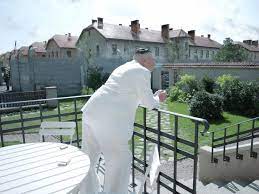Tag: Zone of Interest
-

The zone of (dis)comfort
Jonathan Glazer’s film The Zone of Interest, probably the most unsettling film I have seen (twice) in a very long time, ends with Auschwitz commander Rudolf Höss in an office party in Berlin, far away from his wife and five children with whom he had been living in a luxurious villa just outside the concentration camp walls,…
